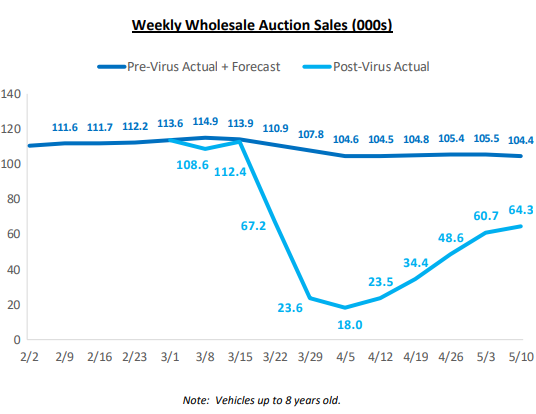Used-Vehicle Market Starts to Unfreeze, “Pent-up Supply” Looms
by Wolf Richter, Wolf Street:
 Now at least, price discovery can take place amid a more ample flow of vehicles. But the entire industry dreads a Hertz bankruptcy could cause lenders to liquidate its fleet.
Now at least, price discovery can take place amid a more ample flow of vehicles. But the entire industry dreads a Hertz bankruptcy could cause lenders to liquidate its fleet.
The images are cropping up all over the Internet: Parking lots of temporarily shut-down stadiums and shopping malls densely packed with cars, SUVs, vans, and pickups. These are rental vehicles that rental car companies don’t know what to do with because they cannot rent them out because their travel market has collapsed. And some of them are off-lease vehicles that had been leased and whose lease expired. This is just part of the pent-up supply. The longer these vehicles sit, the more value they lose.
They need to be sold at wholesale auctions, but auction volume had collapsed in the second half of March and April because auctions were closed and then switched to digital channels, and dealers had shown little interest in stocking up as their own used-vehicle sales had collapsed. And the whole used-vehicle market sort of froze up. This glut of rental and off-lease vehicles is now waiting for the used-vehicle market to unfreeze. And this is beginning to happen.
By contrast, during the Great Recession, it was new vehicles that jammed up the pipeline, with automakers continuing to build and import vehicles while US consumers had gotten spooked and stopped buying them. Annual sales of new vehicles plunged nearly 40% from 2006 to 2009, before gradually recovering to surpass the total of 2006 eight years later, in 2014.
But this time, automakers have shut down their plants, and the supply of new vehicles has been cut off. What’s piling up is used vehicles from rental car companies and lease returns.
The numbers are huge. US rental car companies have been buying around 2 million new vehicles per year (1.9 million in 2019, according to J.D. Power). They keep them for longer than a year on average, so there are about 2.5 million to 3 million rental cars available to drive on average, with more vehicles in various stages of entering the fleets or being removed from the fleets, this being a constant massive flow of cars, normally. But the drain has gotten plugged up.
The drain being plugged up is a big issue because rental-car use has collapsed. Rental car companies need to shrink their fleets to be inline with demand. Cancelling new orders was the first step, and they already did that. J.D. Power estimates that rental car companies will purchase 1.05 million vehicles in 2020, down from 1.9 million in 2019. Now comes the hard part: selling a big portion of the fleet they have but don’t need.
Hertz is on the verge of bankruptcy. At the end of April, it disclosed it had missed a large amount of lease payments on its rental cars. Since then, it has entered into forbearance and waiver agreements with these lenders that give it until May 22 to come up with the money and a plan. Its cars, now parked at various parking lots around the country, are collateral for this debt.
At the end of 2019, Hertz’s US rental fleet was about 567,000 vehicles. Lenders don’t want to end up with these cars either, especially not in this environment where getting out from under them would be tough and painful, and they’re motivated to work out a deal that would keep those cars off their parking lots.
The entire industry hopes that a Hertz bankruptcy can be averted and that those cars don’t suddenly get liquidated by its lenders.
In the second half of March and in April, the used wholesale market essentially froze. The volume of vehicles going through the auction plunged, as many auctions were shut down and dealers weren’t buying. Prices took an all-time record hit. According to J.D. Power, weekly auction volume collapsed from the 110,000-vehicle range before the crisis to a low 18,000 in the first week of April. But auction volume has started to recover and in the second week of May reached 64,300 vehicles (chart by J.D. Power):

Manheim, the largest auto auction house in the US and a unit of Cox Automotive, reported in early May that used-vehicle wholesale prices, based on its Used Vehicle Value Index, had plunged 12.3% in April from pre-Covid February.
Loading...



